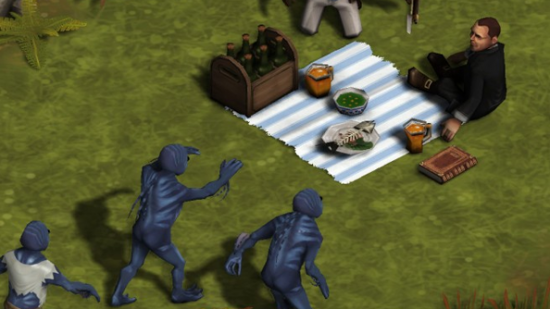Clockwork Empire would be steadily climbing to the top of the list of “Most Fascinating Games of 2014” if such a list were to exist in the PCGamesN offices. Instead we pick what games to preview and shout about based on a complex system of bribes and forfeits.
But, while no one is looking, I can slip out a quick news post about Clockwork Empires newest trailer. It’s a fine balance of colonisation and battling with Lovecraftian horrors.
Clockwork Empires has you colonise a new land in the name of the Queen. You’ll have to harness modern steam technology and the resources of the land to build your town. All the while managing the population. A happy town is a prosperous town, after all.
Getting in the way of your citizens’ happiness is the threat of starvation, alcoholism, disease, and diabolical beings from another plane of existence. This is a game from the makers of Dungeons of Dredmor, it has to have diabolical monsters.
We’ve not seen a great deal of Clockwork Empires yet. Instead everything we’ve learned of the game’s come from Gaslamp’s excellent developer diaries. The most recent one breaks down the difficulty of creating a complex economy that communicates to players how to use it.
“We can’t assume that all players have read the Wikipedia article on how steel is produced, about various states of iron and flux and the role of carbon and so on,” writes developer David Baumgart. “This knowledge insofar as it means anything to the game must be contained in the game’s UI and, further, it must be accessible enough for a player to stumble upon and learn ‘naturally’ (not buried in a “help tome” or something).”
That’s not to say the team are looking to simplify things. That would take the joy out of the system for Baumgart: “The act of putting a bunch of complex commodity production chains into Clockwork Empires makes the game, in part, about learning and optimizing complex commodity production chains. This holds intrinsic fascination to people of certain personalities (hi!) but it can get really messy really fast if handled poorly and could well alienate players whose focus is more on something like narrative, combat challenges, or characters.”
Communication is just a facet of the challenge within a larger problem. Clockwork Empires isn’t a sequel to a previous iteration of a series, Gaslamp have to “create an entire economic infrastructure, from top to bottom, out of whole cloth. No gradual evolution from previous economic systems is possible, because there is no previous economic system. Each interdependent piece must be materialized simultaneously and in perfect working order; otherwise the system will crash out before it ever gets off the ground.”
Or course, this is what a lot of developers go through when creating a new game. Baumgart isn’t claiming it is unique to Gaslamp, he’s simply illuminating the challenge this system of game design presents and isn’t often talked about.
Another challenge of communicating economic information to players is how to attach value to commodities. Gaslamp are shying away from giving things a cash value because “it’s a bit abstract and absolutely not what Clockwork Empires is about,” they “want everything to be extremely concrete.” So how do you let a player know how much wood is worth in comparison to diamonds?
Baumgart going to do it through the amount of labour, or number of jobs, something takes to produce. To acquire wood a player has a townsperson cut down a tree. That’s one job. To make charcoal a player must have a townsperson must cut down a tree and blast it in a furnace. Hey presto, two jobs. It gives “an idea of how ‘advanced’ in the production hierarchy a commodity is” and “gives a hint to us about how much complexity the player must master to attain the commodity in question.”
The post ends with a little tease. Talking about the number of jobs required to make a commodity, Baumgart says “this provides an indication of where we ought to push and pull the design: For instance, one should generally not hide anything too deep that’s required for not having all your characters starve to death. But something that, say, gives a chance of awakening Cosmic Horrors should take a bit more effort to unlock.” This suggests the deeper into the game you delve, the darker the horrors you’ll awaken.
That facet of the game’s design excites me, the world of Clockwork Empires pushes back against you the more you master it. You could argue that this is a mainstay of games, the higher you level up the more dangerous a game’s enemies become, but in those instances XP is gathered unwittingly – as you push through the game you naturally level up. In Clockwork, however, you could explore the land but keep your technology simple and the dangers wouldn’t increase. It’s a direct result of your greed to advance that sees you attacked by horrible creatures.
Clockwork Empires is heading for release in Spring 2014. You can read more about the game on its new website.
